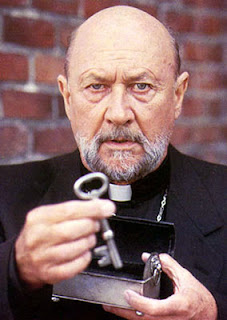As I was reading the latest post from Blood of Prokopius tangentially related to the Civilization vs. Wilderness concept, I returned to an old idea that I'd forgotten.
Assuming a centralized, established, hierarchical church, Clerics have divine rituals that grant boons and supernatural effects, while Mages have systematized pagan rituals that draw on fallen, yet bound gods (or demons, if you will) for their preternatural effects. In Enigmundia, I was planning on having the fallen gods represent spirits and angels and laws that were set over aspects of Creation by the One God, and when they rebelled and were replaced, their innate ability to bend the rules of Creation became accessible by supplicants who know the old ways.
Introducing this concept into a campaign will naturally drive a wedge between cleric PCs and wizard PCs, though perhaps not so much in the early levels. This can lead to a nice "we were friends once, but even then he'd already started down the wrong path" vibe for the cleric, and a similar reaction from the wizard once they hit name level.
Another twist that this can add is the extra layer of complexity to the cosmology of deities and devils: who is the established god or pantheon? who are the fallen pagan gods that still grant power through spells (answering through specific, jealously-guarded formulas that have survived the religious purges)? who are the demons and devils that may have one or two spells mixed into the wizardly body of work?
It can also explain why there are certain new spells or spell variants -- it's from a different fallen god, it's a different sect worshiping the same god, it's a new version that allows the fallen god to break the bonds that imprison it, etc.


I like this idea. Simple but makes a lot of sense.
ReplyDeleteAh, your second paragraph really sets my creative cogs spinning in glee ...
ReplyDeleteThanks! Glad you like it -- because I'm planning on doing more along this line!
ReplyDelete